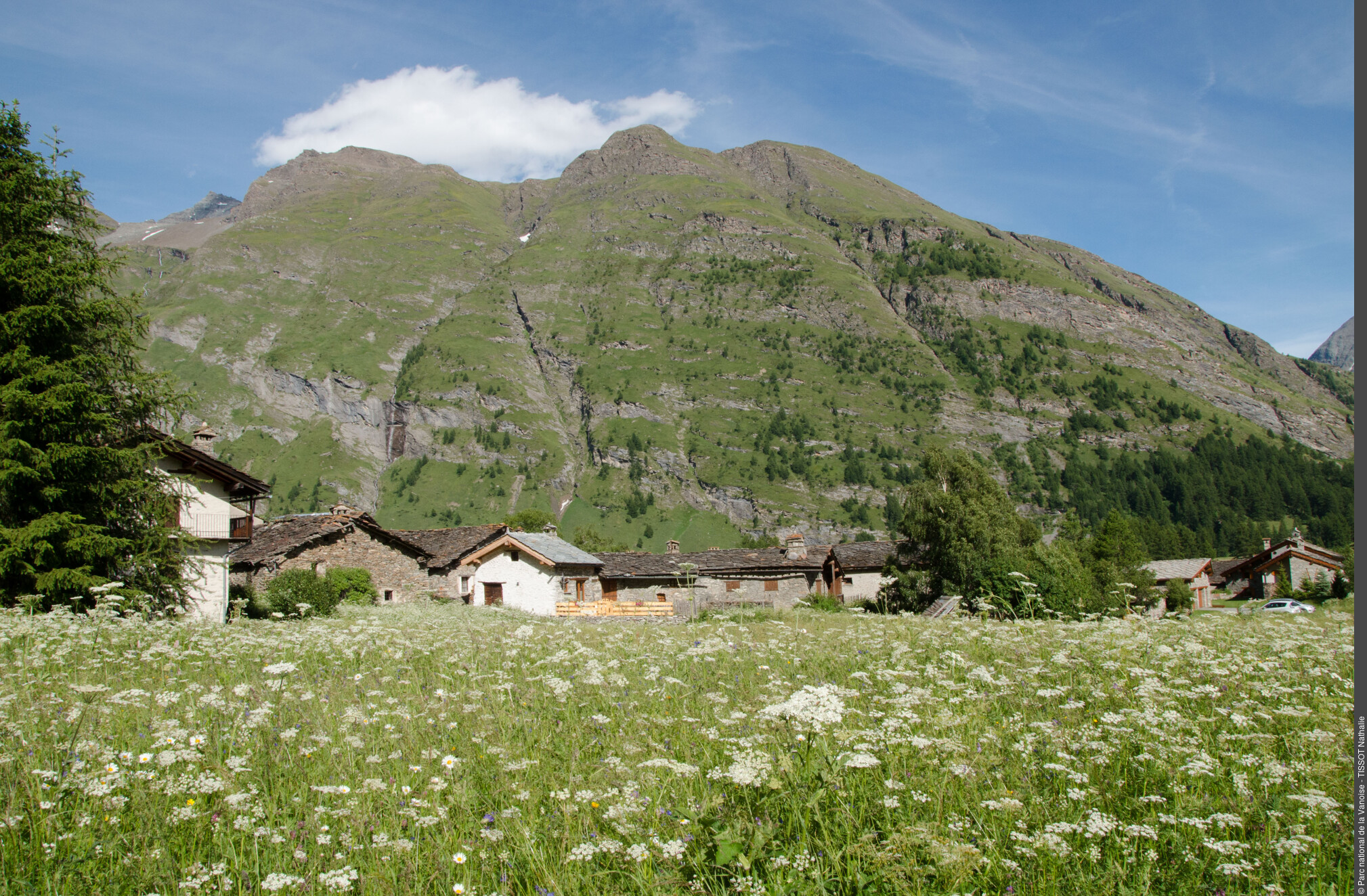
Geology around Bessans
From the summit of the Ouille Allegra, I gaze upon this plain. Seated, it’s time for some questions: where dœs this landscape at my feet come from? How did it come about? Would it be possible to go back to the dawn of time to understand how it was formed?
Description
Place de la Mairie, reach the Ribon car park. Take the path that gœs up the valley towards the biathlon stadium then Goulaz. Then return to Bessans on the paved road for 270 m then turn right onto a wide track. At the first intersection, take the path on the left which runs along a wood and then reach the hamlet of Villaron. From Villaron, go to the centre of Bessans by taking the GR5 path of Petit Bonheur.
- Departure : Place de la Mairie, Bessans
- Arrival : Place de la Mairie, Bessans
- Towns crossed : BESSANS
Forecast
Altimetric profile
Information desks
Maison Cantonale, 9 Place Sommeiller, 73500 Modane
Vanoise Information Desk - Termignon
Place Vanoise, 73500 Termignon
Transport
Access and parking
Take the D902 in the direction of Bessans, stop in the heart of the village in the main square.
Parking :
9 points of interest
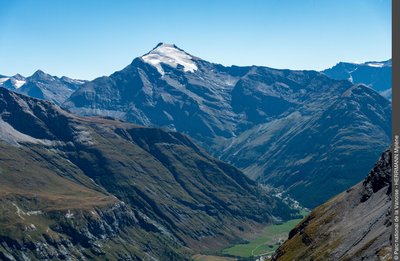
La plaine de Bessans - Mylène HERRMANN  Viewpoint
ViewpointThe Bessans plain
This vast plain is due to the ancient existence of an ancient lake resulting from the collapse of the Madeleine (rock bar forming a small pass downstream of Bessans). So here were rest on the sediments!
 Geology
GeologyRocks present
The slopes of the valley are mainly composed of schists and marbles, caused respectively by the transformation by temperature and pressure of clay and limestone. These rocks are known as metamorphic. The schists have undergone another transformation giving them a smooth appearance and are said to be shiny. Be careful not to slip!
 Geology
GeologyA green.... rock!
The colour indicates that this rock was formed in the alpine (Tethys) ocean from magma, then transformed and pleated before being exhumed by the planetary tectonic movements in Haute-Maurienne! During these movements, the rocks were fractured and the voids filled with other elements (CO2, water ...), forming veins of various minerals, including quartz.
 Geology
GeologyOverthrust sheets
On the opposite side, you can see two different rock masses: a dark dome and a lighter upper part. The superposition of these two overthrust sheets of different geological formations marks the rapprochement of the African and Eurasian tectonic plates, originating in the Alps.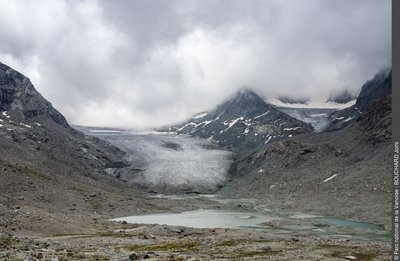
Ambiance sur le glacier du Baounet, commune de Bessans. - Joris BOUCHARD  Geology
GeologyMorainic arches
Two morainic arcs are present on Bessans, but the southernmost one is the most marked. It is underscored by large blocks deposited by the successive advances and retreats of the glacier. Their composition, from augen gneiss, containing feldspar crystals in the form of a horse tooth, testifies to their origin some kilometres higher up in the valley at the hamlet of Écot de Bonneval-sur-Arc.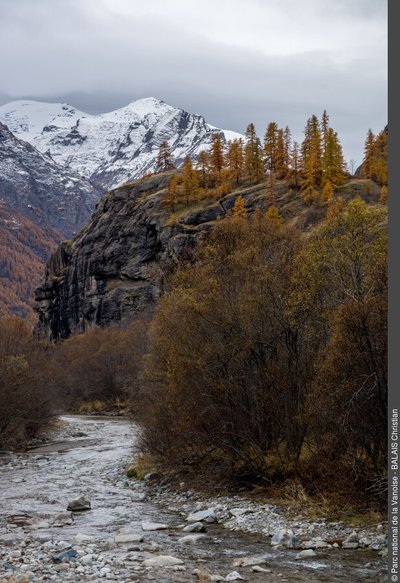
Le Rocher du Château - Christian BALAIS  Geology
GeologyThe valley behind bars!
The castle rock forms a rock bar, a rocky mass that closes the valley. The basin, the largest part between the two rock bars, is gouged out by glaciers while the rock bar is made of harder rock and less planed by the glacier. The castle rock bar consists of serpentinite, a hard green rock derived from the metamorphism of sea-floor rocks born in the Jurassic.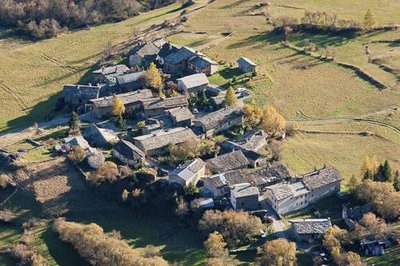
Le hameau du Villaron, Bessans. - PNV - DEFFRENNES Benoît  Architecture
ArchitectureVillaron
The buildings of the Villaron are a testament to old construction techniques. The walls are actually made of two stone walls filled with other materials such as small stones, earth, moss… and rendered on the outside to improve the building’s insulation. The stonemasons identified their walls with specially arranged stones. The roofs were made of uneven lauze, resting on a wooden frame.
Before the village stands the chapel of Saint Bernard, patron of mountaineers and climbers. In the heart of the village’s houses is the last washhouse of Bessans, where the cows came to water, and the inhabitants took their water supply. It is still possible to do so! A little further on is the 13th century chapel of Saint-Colomban, which has been rebuilt three times after being destroyed by the avalanches! In front of the chapel is the typical cross of Bessans, which tells the story of the passion of Christ. Then in the same alleyway, a discerning eye will spot on the left a face carved into a beam once representative of Bessans houses. It is time to leave the hamlet and return back to nature but on the descent, you can still stop for refreshment at the gîte, the old school, or come to see the 17th century bread oven...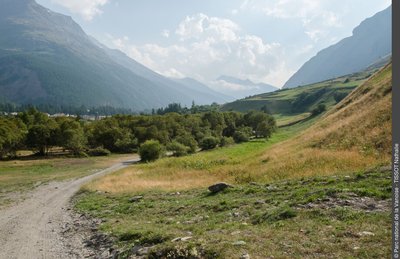
effondrement du Raclot ayant permis l'établissement de la station de ski alpin - Nathalie TISSOT  Geology
GeologyGeology, stakeholder in tourism?
Le Raclot is the only place where you can go skiing in Bessans!The glacier applies pressure onto the valley slopes. As they retreated, the glacier’s pressure disappeared and the weakest areas, such as Le Raclot, collapsed, forming gentler slopes at the foot of the slope. The installation of ski lifts was then made possible!
 Geology
GeologyWhat is the geological future of the Bessans plain?
Geology is the master of our landscapes, the composition of our soil and therefore in short our activities! What will happen in 10, 100, 1,000 or 10,000 years from now? What will the physiognomy of this plain be like, and how will it affect the activities that take place there? If the Alps continue to grow, climate change is likely to play a significant role...
